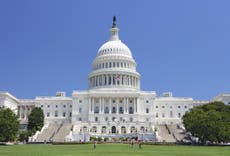Why would Google turn up to the Senate hearing? Silicon Valley plays by its own rules
It’s little wonder that tech companies think they’re above complying with government requests

In the latest example of a tech giant squaring up to the government, Google turned down an invitation to appear before the Senate Intelligence Committee in Washington DC on Wednesday, where the topics up for discussion included election meddling and security.
The firm’s initial offer to send along chief legal officer Kent Walker was countered with a request from the committee that a more senior representative for the group attend, such as the chief executive, Sundar Pichai, or Larry Page, CEO of Google’s parent company Alphabet.
However, in the end, the company decided against appearing at all, choosing instead to publish its testimony online ahead of the hearing.
This isn’t the first time a tech giant has snubbed politicians: earlier this year, the UK’s Digital, Culture, Media and Sport Committee summoned Facebook boss Mark Zuckerberg to give evidence in an inquiry into the Cambridge Analytica data breach. A few days later, Zuckerberg said thanks, but no thanks, and announced that another Facebook exec would be sent in his place.
The social media tycoon rarely speaks publicly about his company’s perceived failings, which is understandable – nobody likes admitting to mistakes. But he is also rarely compelled to speak about problems within the organisation or with its products.
He might be asked, he usually says no, and that’s it. So it’s not terribly surprising when his Silicon Valley peers follow the same course of action.
The Facebook founder eventually did make an appearance at a Senate hearing on the same topic MPs wanted to question him about, and what a wasted opportunity it was. Several senators on the questioning panel seemingly had little to no idea of how the company operated, or even what it was – one of them asked Zuckerberg if Facebook friends were really friends.
Displays like this arguably make politicians complicit in the tech industry’s apparent disregard for governments and regulators, on two levels.
Firstly, nothing useful comes from seeing tech bosses deftly deal with soft questions from investigators who don’t have the expertise to know when they’re being fobbed off with similarly soft answers.
Secondly, it gives these titans of industry a pass if they’re asked to answer questions at any point in the future – if nothing came of an earlier inquisition, what’s the point in doing it all over again?
It’s little wonder that tech companies think they’re above complying with government requests.
Of course, this doesn’t apply to the entire sector. Uber’s (relatively) new chief executive, Dara Khosrowshahi, stands out as a Silicon Valley boss who is eager to show that his company is happy to work with the authorities and face up to past mistakes.
However, Mr Khosrowshahi and his more obliging management style were only employed after Uber had reached crisis point, and Uber provides a service for which regulation was already in place – it’s a tech company, but taxis have been around for a lot longer than the internet.
For the likes of Google and Facebook, there were no rules to abide by when they launched, and policymakers have been playing catchup ever since.
The disregard tech firms show for politicians trying to find a way to legislate for the internet age is borne of years of having free reign over how their businesses operated.
And the wider, more damaging repercussions of this unfettered existence can be clearly seen in the recent goings on at Tesla, where chief executive Elon Musk incurred the wrath of the Securities and Exchange Commission by tweeting “plans” to take the electric carmaker private. It’s not out of character for Musk to behave outside the norms of a typical CEO; refusing to answer “boring” questions about financials, throwing accusations at divers.
But surely he has found it both easier and perhaps more tempting to do so because the tech industry in general sees itself as being a world apart.
Silicon Valley has made its own rules, and they’re the only ones it cares to follow.






Join our commenting forum
Join thought-provoking conversations, follow other Independent readers and see their replies